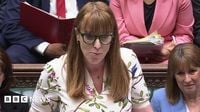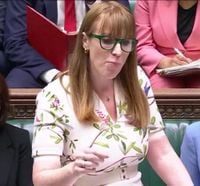Deputy Prime Minister Angela Rayner found herself in the political hot seat for the second consecutive week at Prime Minister's Questions (PMQs) on Wednesday, stepping in for Keir Starmer, who was attending a NATO summit in The Hague. The session was dominated by the government's controversial welfare reforms, which have sparked an unprecedented rebellion within the Labour Party, with more than 120 MPs publicly opposing the proposed cuts.
Shadow Chancellor Mel Stride, standing in for Tory leader Kemi Badenoch, seized the opportunity to press Rayner on her party’s internal divisions and the government's fiscal policies. Stride challenged Rayner to justify why she supported the government's welfare cuts when a significant faction of her own party did not. He pointedly asked her to explain why she was right and the 122 Labour rebels were wrong. Rayner was unable to provide a direct answer, instead reiterating the government’s commitment to pressing ahead with the reforms and insisting that a vote on the legislation would take place on Tuesday, July 1, 2025.
Stride's questioning was laced with sharp political barbs, including a pointed reference to Rayner’s rumored leadership ambitions within Labour. “We have a great deal in common,” Stride said, “not least that we both viscerally disagree with the Chancellor’s tax policies.” He also quipped that many Labour MPs sitting behind Rayner wished her temporary role standing in for the Prime Minister was permanent, highlighting the ongoing leadership speculation within the opposition party.
The welfare reforms at the heart of the debate aim to save £5 billion annually by 2030 by reducing eligibility for Personal Independence Payments (PIP), a benefit for those with long-term health conditions. However, the cuts have drawn fierce criticism due to their potential impact on vulnerable groups. The proposed changes could see 800,000 people lose an average of £4,500 per year, potentially pushing an additional 250,000 people, including 50,000 children, into poverty.
Despite the growing rebellion, Prime Minister Starmer has insisted the reforms are necessary, arguing that the current system is failing millions and that the changes will help more people into work. Supportive ministers have emphasized that the reforms are not solely about cost-cutting but also about improving employment support tailored to individual needs. Rayner echoed this stance during PMQs, highlighting a £1 billion investment in tailored employment support and measures to end reassessments for the most severely disabled who are unlikely to work.
Stride also pressed Rayner on the government's tax policies, pushing her to repeat a pledge made by Chancellor Rachel Reeves that there would be no further tax rises in the upcoming budget. Rayner declined to make such a commitment, dismissing the question as “a bit rich” given the Conservatives’ record of raising taxes to record highs before the last election. She accused the Tories of having “an absolute nerve” to lecture Labour on taxation, recalling how council tax rose every year under their government.
Stride referenced an analysis from the Institute for Fiscal Studies (IFS), which warned that local authorities would likely have to raise council tax to the maximum allowed to fund local services, resulting in “the biggest council tax increases in a generation” and a £7 billion tax rise. He questioned why Rayner did not acknowledge that council tax is paid by working people, a term Labour uses to distinguish from the wealthy.
Rayner countered by pointing to Labour’s recent spending review, which included the biggest uplift to affordable housing in a generation, a significant boost to the minimum wage, and an expansion of free school meals to half a million children. She framed these policies as putting working people first, contrasting them with what she described as “billions of pounds in unfunded tax cuts for the wealthiest” under the Tories, which she blamed for economic failure.
The political tension was palpable as Stride offered Conservative support for the welfare reforms, but only if Labour committed to reducing the overall welfare bill and getting people off benefits and into work. Rayner rejected this demand as shameless, given the Conservative Party's record on austerity and economic management.
With the rebellion growing, the government faces a precarious path to passing the welfare bill. The vote scheduled for Tuesday is crucial, and the outcome remains uncertain. Rayner insisted the government would not back down, saying, “We will go ahead on Tuesday,” despite the internal dissent.
Meanwhile, Prime Minister Starmer, at the NATO summit, announced a significant increase in UK defence spending, pledging to raise it to 4.1% of GDP by 2027 and 5% by 2035. He emphasized the importance of nuclear deterrence and NATO unity amid global volatility. However, US President Donald Trump cast doubt on the US commitment to NATO’s Article 5 mutual defence clause, prompting Starmer to reaffirm the alliance’s enduring relevance and strength.
Defence Secretary John Healey acknowledged there is no immediate threat of invasion but stressed the need for Britain to prepare for possible war on home soil. He also defended the government's plan to acquire a new fleet of F35A jets capable of carrying nuclear weapons, rejecting suggestions this marked a return to Cold War posturing.
However, questions remain over how the government will fund the promised £90 billion hike in defence spending. Healey admitted there is no fully worked-out 10-year budget plan, drawing criticism from political commentators.
As the welfare rebellion intensifies and the government commits to ambitious defence spending, Labour’s leadership and unity are under scrutiny. The coming days will be critical in determining whether Starmer’s government can navigate these challenges or face further political upheaval.



